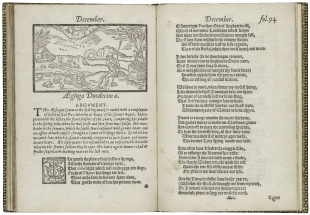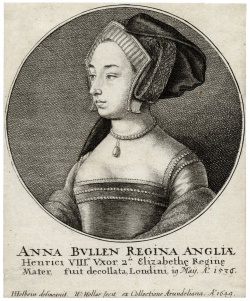A Decade of Collecting: Celebrating Ten Years of Acquisitions

Curated by Laura Cofield, Melissa Cook, Werner Gundersheimer, and Richard Kuhta, A Decade of Collection: Celebrating Ten Years of Acquisitions, was part of the Exhibitions at the Folger which opened on June 28, 2000 and closed on November 25, 2000.
In their work as collectors, Mr. and Mrs. Folger followed a straightforward path. For anything directly related to Shakespeare, they would stretch to the limit of their financial capabilities. Lacking the enormous resources available to their competitors—Pierpont Morgan and Henry E. Huntington—the Folgers kept their focus and acquired the biggest and best collection of Shakespeareana the world had ever seen. Successive generations of acquisitions librarians at the Folger have had many interesting opportunities over to perfect and extend Mr. and Mrs. Folgers' original collection. Over the past decade, in particular, we have been able to purchase quite a few rare and beautiful editions, some of which may never come on the market again.
We begin A Decade of Collecting in the dawn of printing, with pre-1501 imprints called incunabula, and conclude with examples of contemporary book design. The artwork displayed covers sixteenth century engravings to eighteenth century porcelain and decorated papers, and the manuscripts reach from Sir Walter Raleigh to Thomas Carlyle and Horace Howard Furness. Visitors are sometimes surprised to learn the Folger collects so widely, in areas far afield from Shakespeare and his contemporaries.
A Decade of Collecting shows the degree to which collectors follow the scent of appropriate acquisitions, the support of individuals and organizations that share the Folger's vision, and the treasures themselves. It commemorates the tireless hunt for books, manuscripts, and art, and celebrates the outstanding beauty and intellectual value of these physical objects.
Exhibition material
Siddons Portrait
After an unsuccessful London debut which drove her to the provinces, Sarah Kemble Siddons (1755-1831) played to adoring audiences in Bath and the midlands before returning to triumph in Garrick's production of The Fatal Marriage in 1782. Over her long and brilliant career, Siddons became London's "Tragic Muse," winning the highest possible accolades for her roles as Lady Macbeth, Queen Catharine (Henry VIII), and Volumnia (Coriolanus). Bowing to write his name on the hem of her dress, Dr. Johnson said, "I could not lose the honor this opportunity offered….for my name going down to posterity on the hem of your garment." [1]
This is one of many items belonging to the the Craven Collection of Theatrical Memorabilia given by Babette Craven to the Folger.
The Shepheardes Calendar
The Shepheardes Calendar established Spenser's poetic genius among his contemporaries. It tells the story of Colin Clout, a lovelorn shepherd who laments ill treatment from his beloved Rosalind. Presented as a narrative in twelve eclogues-each month written in a different meter-the simple tale is a poetic tour de force. One of only seven extant copies of the first edition, the Folger copy is unique, the only one with the final quire in an early uncorrected state.
Purchased as the partial gift of James O. Edwards, the Andrew W. Mellon Foundation, the Trustees Fellowship and Acquisitions Fund, and Friends of Eric Weinmann.
Oeuvres de Louise Charly
Only 525 copies of this exceptional volume of the collected writings of French feminist and poet Louise Labé were printed. Editions of Labé's collected works are very scarce; they were published only in 1555, 1556, and in this edition of 1762.
Amoretti and Epithalamion
In the Amoretti, a sonnet sequence, Spenser records his wooing of Elizabeth Boyle (named in sonnet 74), who became his wife on June 11, 1594 while he was posted in Ireland. Their union is celebrated in one of the greatest lyrics in English poetry, Epithalamion, a marriage ode. The Folger's copy is one of only six complete copies of the first edition.

Anna Bvllen
Queen Anne Boleyn, second wife of Henry VIII and mother of Queen Elizabeth I, was executed in 1536 on a charge of adultery. Wenceslaus Hollar's etching of her is based on Holbein's drawing formerly in Lord Arundel's collection. The portrait is an example of Hollar's careful attention to the details of clothing and jewelry.
Gift of Mrs. John Farr Simmons in honor of Elizabeth Neimyer.
Items included
- Portrait of Sarah Siddons. Multicolored enamel. s.n., 1798. 241354 ART.
- Edmund Spenser. "The shepheardes calendar." London, 1579. STC 23089. LUNA Digital Image.
- Edmund Spenser. Amoretti and Epithalamion. London, 1595. STC 23076.
- Wenceslaus Hollar. Anna Bullen Regina Angliae. Etching, s.n., 1649. ART 234101 LUNA Digital Image.
Additional resources
Learn more about the ways that you can help grow the Folger's collections by supporting us through friends circles, sponsorship, and planned giving.
Notes
- ↑ Boswell's Life of Johnson. Oxford: Clarendon Press, 1934-1950, IV, 242, n.2.